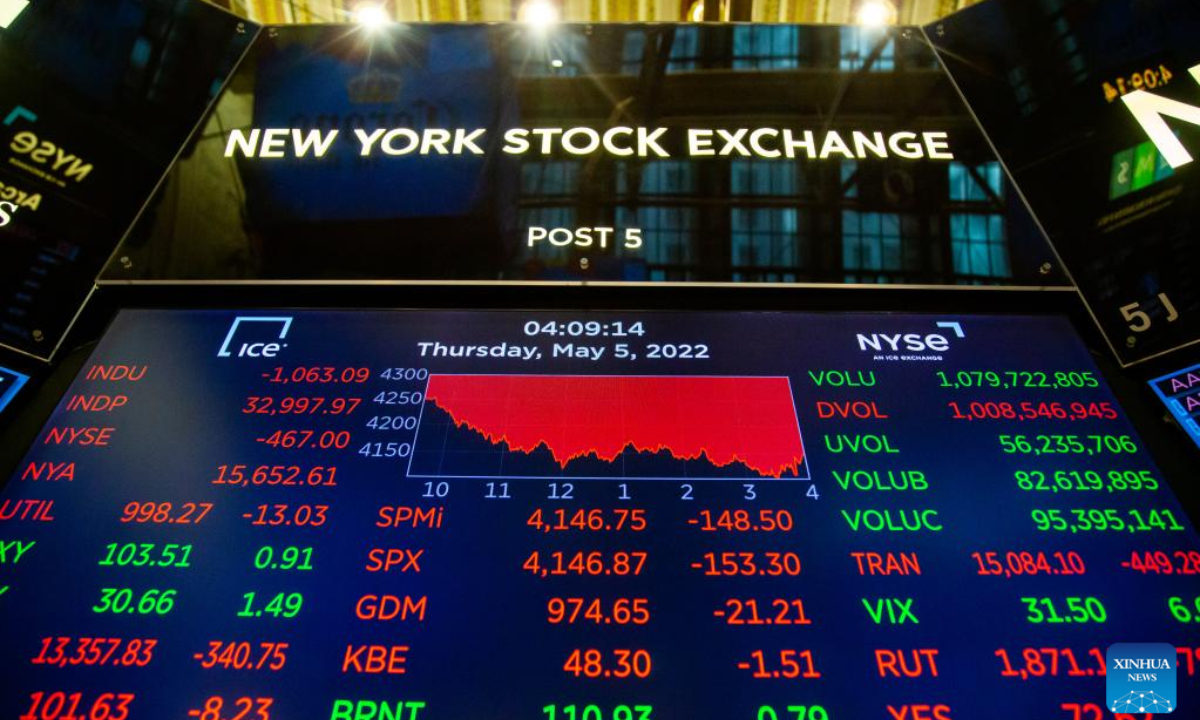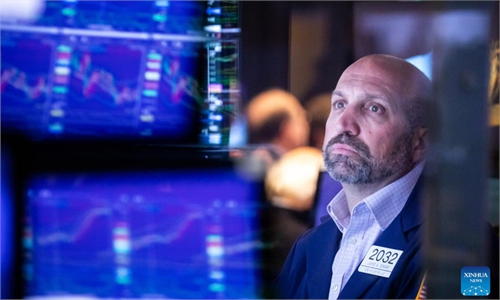
Electronic screens display stock market information at the New York Stock Exchange (NYSE) in New York, the United States, May 5, 2022. Photo:Xinhua
As the US' latest monetary policy shift failed remarkably to calm financial markets in the US and around the world, reflected in recent plunges in stock markets, and expectation is growing for the US to take more aggressive actions to tame decades-high inflation and reverse a possible recession, Chinese experts are warning spillover risks from the toxic US policies and calling for long-term responses.
After US stocks plummeted over the US Federal Reserve's move to hike its benchmark interest rate, US officials on Friday defended their move as being not too late to curb inflation. The Fed on Wednesday announced a half-point increase in its benchmark rate, the sharpest rate hike since 2000, as part of its effort to fight inflation.
Admitting the US' inflation is "far too high," St. Louis Fed President James Bullard argued that the Fed is "not as far behind the curve" in containing inflation, Reuters reported.
Chinese experts warn that it may be difficult for the Fed to use monetary tightening by such moves as interest rate hikes to curb high inflation, and their impact on global financial markets and the global economy, especially highly indebted economies, will be serious.
The slump in the stock market after the US interest rate hike showed that the bubble in the US stock market lacks the support of economic fundamentals, and tightening measures such as interest rate hikes bring risks, Yu Xiang, a non-resident research fellow at the Center for International Security and Strategy at Tsinghua University, told the Global Times on Saturday.
Moving from an extremely loose monetary policy to being forced to tighten it to deal with inflation, US monetary policy will cause chaos in international capital flows, which poses great risks to international financial markets and other economies, especially highly indebted countries, Yu noted.
There are deep-rooted structural causes for US inflation. The effect of tightening policy is expected to be less than what US officials have claimed, according to experts.
The decades-high inflation in the US is the result of a confluence of multiple factors, including its previous extremely loose monetary policy, supply chain disruptions and a wage-price spiral, which are difficult to solve at present, said Dong Shaopeng, a senior research fellow at the Chongyang Institute for Financial Studies at Renmin University of China.
The most difficult problem to solve is the wage-price spiral, as the COVID-19 pandemic worsened the gap between the rich and the poor in the US. Although the US reported an overall unemployment rate of 3.6 percent in April, the unemployment rate of certain groups, especially low-income groups, is still relatively high, Yu said.
Behind soaring inflation in the US is the risk of economic stagnation, which is an intractable policy dilemma. It is estimated that it will take three to five years for the US to get out of this quagmire. Other economies should be prepared to deal with its spillover effects in the long run, said Gao Lingyun, an expert at the Chinese Academy of Social Sciences in Beijing.
The US is making a major monetary policy shift, which will have a long-term impact on the global macro situation and international capital flows. The process has just begun, and economic policymakers of all countries should make preparations for long-term responses, rather than simply responding to a single rate hike, Gao remarked.

